Anthony Braxton
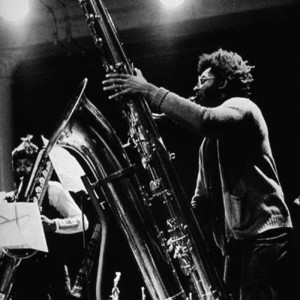
- Genres:
- Avant-Garde, Classical, Jazz
- Meta styles:
- Avant-Garde Music, Big Band/Swing, Free Jazz, Improvised Music, Jazz Instrument
- Styles:
- Avant-Garde Jazz, Creative Orchestra, Experimental Big Band, Free Jazz, Saxophone Jazz, Structured Improvisation
Anthony Braxton (born June 4, 1945) is an American composer, saxophonist, clarinetist, flautist, pianist and philosopher. He has created a large body of highly complex work. Braxton is one of the most prolific American musicians/composers to date, having released well over 100 albums since the 1960s. Among the vast array of instruments he utilizes are the flute; the sopranino, soprano, C-Melody, F alto, E-flat alto, baritone, bass, and contrabass saxophones; and the E-flat, B-flat, and contrabass clarinets.
Braxton's music is difficult to categorize, and because of this, he likes to reference his works (and the works of his collaborators and students) as simply "creative music." He has claimed in numerous interviews that he is not a jazz musician, though many of his works have been jazz and improvisation oriented, and he has released many albums of jazz standards. In addition to these, Braxton has released an increasing number of works for large-scale orchestras, including two opera cycles.
Braxton's music is highly theoretical and mystically influenced, and he is the author of multiple volumes explaining his theories and pieces?such as the philosophical three-volume Triaxium Writings and the five-volume Composition Notes, both published by Frog Peak Music. While his compositions and improvisations can be characterized as avant-garde, many of his pieces have a swing feel and rhythmic angularity that are overtly indebted to Charlie Parker and the bebop tradition.
Braxton is notorious for naming his pieces as diagrams, typically labeled with cryptic numbers and letters. Sometimes these diagrams have an obvious relation to the music ? for instance, on the album For Trio the diagram-title indicates the physical positions of the performers ? a variation on aleatory music that presaged his follower John Zorn's Xu Feng: John Zorn's Game Pieces, Volume I and Cobra: John Zorn's Game Pieces, Volume 2 ? but in many cases the diagram-titles remain inscrutable. The titles can themselves be musical notation indicating to the performer how a piece is played. Sometimes the letters are identifiable as the initials of Braxton's friends and musical colleagues.
Braxton has pointedly refused to explain their significance, claiming that he himself is still discovering their meaning. Braxton eventually settled on a system of opus-numbers to make referring to these pieces simpler, and earlier pieces have had opus-numbers retrospectively added to them.
By the mid-to-late 1980s, Braxton's titles had become increasingly complex. They began to incorporate drawings and illustrations, such as in the title of his four act opera cycle, Composition No. 162 (Trillium R) [Act 1] Others began to include life-like images of inanimate objects, namely train cars. The latter was most notably seen after the advent of his Ghost Trance Music system.
Anthony Braxton, even in his 60s, still actively performs with ensembles of varying sizes, and has to date written well over 350 compositions. He has just recently finished the last batch of Ghost Trance Music compositions, and has now shown his interest in three other music systems: The Diamond Curtain Wall Trio, in which Braxton implements the aid of the powerful computer audio programming language, SuperCollider; Falling River Musics; and, most recently, Echo Echo Mirror House music, which is meant to hone in many different types of performance arts in addition to music.
Critic Chris Kelsey writes that "Although Braxton exhibited a genuine ? if highly idiosyncratic ? ability to play older forms (influenced especially by saxophonists Warne Marsh, John Coltrane, Paul Desmond, and Eric Dolphy), he was never really accepted by the jazz establishment, due to his manifest infatuation with the practices of such non-jazz artists as John Cage and Karlheinz Stockhausen [and though Kelsey doesn't mention it, Braxton has long been interested in Arnold Schoenberg's music]. Many of the mainstream's most popular musicians (Wynton Marsalis among them) insisted that Braxton's music was not jazz at all. Whatever one calls it, however, there is no questioning the originality of his vision; Anthony Braxton created music of enormous sophistication and passion that was unlike anything else that had come before it."
Early in his career, Braxton led a trio with violinist Leroy Jenkins and trumpeter Wadada Leo Smith and was involved with The Association for the Advancement of Creative Musicians, the "AACM", founded in Chicago, Illinois, Braxton's birthplace.
In 1968, Braxton recorded the double LP For Alto. There had been occasional unaccompanied saxophone recordings previously (notably Coleman Hawkins' "Picasso"), but For Alto was the first full-length album for unaccompanied saxophone. The album's songs were dedicated to Cecil Taylor and John Cage, among others. The album influenced other artists like Steve Lacy (soprano sax) and George Lewis (trombone), who would go on to record their own acclaimed solo albums.
Braxton joined pianist Chick Corea's existing trio with Dave Holland (double bass) and Barry Altschul (drums) to form the short-lived avant garde quartet Circle, around 1970. When Corea broke up the group, forming Return to Forever to pursue a fusion based style of composition and recording, Holland and Altschul remained with Braxton for much of the 1970s as part of a quartet, with the rotating brass chair variously filled by trumpeter Kenny Wheeler, or trombonists George Lewis or Ray Anderson. This group recorded on Arista Records. The core trio plus saxophonist Sam Rivers recorded Holland's Conference of the Birds, on ECM. In the 1970s he also recorded duets with Lewis and with synthesizer player Richard Teitelbaum.
In 1975, he released an album on Muse Records titled Muhal with Creative Construction Company, a group consisting of Richard Davis (Bass), Muhal Richard Abrams (Cello/Piano), Steve Mccall (drums), Wadada Leo Smith (trumpet) and Leroy Jenkins (violin).
In the late 1970s he recorded two large ensemble recordings, "Creative Orchestra Music 1976," inspired by American jazz and marching band traditions, and "For Four Orchestras." Both of these records were released on Arista.
Braxton's regular group in the 1980s and early 1990s was a quartet with Marilyn Crispell (piano), Mark Dresser (double bass) and Gerry Hemingway (drums). It has been called "his finest and longest standing band".
Braxton has also recorded and collaborated with European free improvisers such as Derek Bailey, Evan Parker, and the Globe Unity Orchestra, or with giants from the 'regular' jazz world, such as Max Roach. Throughout the years Braxton has played with a wide variety of people, such as Mal Waldron, Dave Douglas, Ornette Coleman, Dave Brubeck, Lee Konitz, Peter Brötzmann, Willem Breuker, Muhal Richard Abrams, Steve Lacy, Roscoe Mitchell, Pat Metheny, Andrew Cyrille, Wolf Eyes, Misha Mengelberg, Chris Dahlgren, Lauren Newton, and countless others.
In 1994, he was granted a MacArthur Fellowship. From 1995 to 2006, Braxton's output as a composer concentrated almost exclusively on what he calls "Ghost Trance Music", which introduces a steady pulse to his music and also allows the simultaneous performance of any piece by the performers. Many of the earliest Ghost Trance recordings were released on his own Braxton House label (now defunct). His final Ghost Trance compositions were performed with a "12+1tet" at New York's Iridium club in 2006; the complete four-night residency was recorded and released in 2007 by the Firehouse 12 label as 9 Compositions (Iridium) 2006
In addition, during the 1990s and early 2000s Braxton created a prodigiously large body of "standards" recordings, often featuring him as a pianist rather than saxophonist. He had frequently performed such material in the 1970s and 1980s, but only recorded it occasionally; now he began to release multi-disc sets of such material, climaxing in two quadruple-CD sets for leo Records recorded on tour in 2003.
More recently he has created new series of compositions, such as the Falling River Musics that are documented on 2+2 Compositions (482 Music, 2005).
Braxton studied philosophy at Roosevelt University. He has taught at Mills College and now is Professor of Music at Wesleyan University in Middletown, Connecticut, teaching music composition, music history, and improvisation.
Moreover, Braxton is the father of Tyondai Braxton, who was a member of Battles.
- Sort by
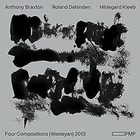
Braxton: Four Compositions Wesleyan 2013
- Release date:
- Apr 05, 2024
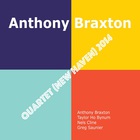
Quartet (New Haven) 2014 CD4
- Year:
- 2019
- Tracks:
- 1
- Bitrate:
- 320 kbps
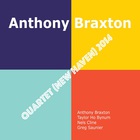
Quartet (New Haven) 2014 CD3
- Year:
- 2019
- Tracks:
- 1
- Bitrate:
- 320 kbps
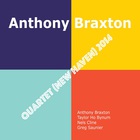
Quartet (New Haven) 2014 CD2
- Year:
- 2019
- Tracks:
- 1
- Bitrate:
- 320 kbps
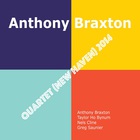
Quartet (New Haven) 2014 CD1
- Year:
- 2019
- Tracks:
- 1
- Bitrate:
- 320 kbps
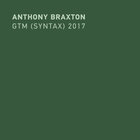
Gtm (Syntax) 2017
- Year:
- 2019
- Tracks:
- 12
- Bitrate:
- 320 kbps
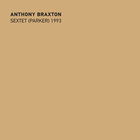
Sextet (Parker) 1993 CD11
- Year:
- 2018
- Tracks:
- 6
- Bitrate:
- 320 kbps
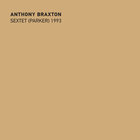
Sextet (Parker) 1993 CD10
- Year:
- 2018
- Tracks:
- 6
- Bitrate:
- 320 kbps
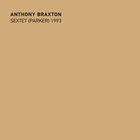
Sextet (Parker) 1993 CD9
- Year:
- 2018
- Tracks:
- 6
- Bitrate:
- 320 kbps
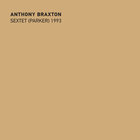
Sextet (Parker) 1993 CD8
- Year:
- 2018
- Tracks:
- 4
- Bitrate:
- 320 kbps
 Roscoe Mitchell
Roscoe Mitchell  Sam Rivers
Sam Rivers  Sun Ra
Sun Ra  Tim Berne
Tim Berne  Julius Hemphill
Julius Hemphill  Andrew Hill
Andrew Hill  Henry Threadgill
Henry Threadgill  Mats Gustafsson
Mats Gustafsson  Muhal Richard Abrams
Muhal Richard Abrams  Rob Mazurek
Rob Mazurek  Wadada Leo Smith
Wadada Leo Smith